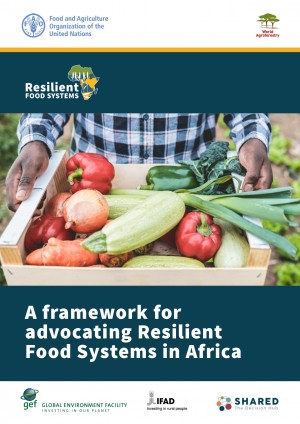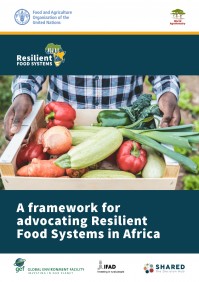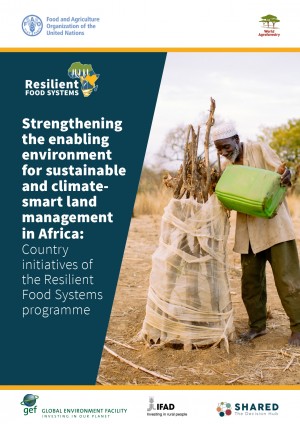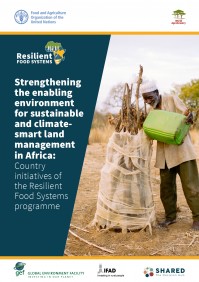The benefits of Farmer Field Schools grow every year
28 April 2023
Project Name
Support for Sustainable Food Production and Enhancement of Food Security and Climate Resilience in Burundi's Highlands
GEF Implementing Agency
FAO
Objective
To increase the adoption of resilient, improved production systems for sustainable food security and nutrition through integrated landscape management and sustainable food value chains.
Project Targets
land under integrated and sustainable management
GHG emissions avoided or reduced
beneficiary households
Burundi’s economy is dominated by small-scale rainfed agriculture. 50% of the country’s land area is dedicated to small-scale farming and more than 90% of the total population relies on subsistence agriculture for their livelihood.
In Burundi’s highlands, environmental degradation has resulted in persistently low crop and livestock productivity, loss of ecosystem services and loss of agrobiodiversity. This decline in agricultural productivity has not only increased food insecurity for millions of smallholder farmers, but also contributes to poverty, social conflict, rural-urban migration and vulnerability to climate change. These impacts are particularly felt amongst vulnerable population groups, including women, youth, and the elderly.
This project uses an innovative, multisectoral approach, involving coordination at national, provincial, and local levels to ensure support for sustainable land management. This approach focuses on establishing policy platforms and knowledge sharing mechanisms to help strengthen national- and local-level support systems.
The project is structured around three principal components:
The lessons and good practices of the project are captured and promoted by the Farmer Field Schools (FFS). This approach to the systematization of knowledge management supports the replication and scaling-up of project results in the country and across the region.
Overall, the project is designed to benefit 33,534 rural households through the support of catchment-level planning, improved agricultural practices, operationalisation of Farmer Field Schools, restoration of degraded land, and sustainable land management.
The project aims to meet the following targets:
Institutional frameworks and support mechanisms strengthened.
Livelihoods and food security improved through integrated watershed management.
Monitoring and Assessment systems established to track global environmental benefits and socio-economic impacts.
At the national level, the Ministry of Agriculture and Livestock (MINAGRIE) is the lead government counterpart and coordinating agency in this project and works in close collaboration with the Ministry of Water, Environment, Spatial and Urban Planning (MEEATU).
At the provincial level, the decentralized structures of the two ministries are involved with the Provincial Directorates of Agriculture and Livestock (DPAE) and with the Burundi Office for the Protection of the Environment (OBPE).
At the communal level, the project interventions are supervised by the communal or zonal agronomist. The capacities of Farmer Field School Groups, cooperatives, and watershed committees are being reinforced to support local communities, who are the main beneficiaries of the project.
Each RFS country project conducts activities that fall under common thematic areas within the programme. Explore each project theme relevant to the RFS Burundi country project below to see which activities are being implemented under each theme.
Stories from the Field
Explore our stories from the field to learn more about the activities, milestones, lessons learned, and achievements of the RFS Burundi project.
Relevant Resources
We have a growing library of reports, briefs, case studies, media, tools and guidelines. Explore all resources related to the RFS Burundi project to get greater insight into our programme activities.


This framework aims to deepen the understanding of country teams to clarify their engagement in leveraging policy, institutional and behavioural change for achieving positive policy, institutional and human behavioural changes necessary to meet resilient food systems objectives. It provides an outline of the fundamental elements in the design and implementation of an advocacy strategy including understanding decision cycles and influence for sustainable land management and agroecological systems; shares experiences reflecting different scales of intervention (national, sub-national, local); and provides examples of how different mechanisms such as multi-stakeholder platforms can be used as an engine of socio-ecological change.


Barriers to implementation of sustainable land management (SLM) practices limit their ability to contribute to addressing land degradation. This report presents country case studies from the Resilient Food Systems programme highlighting SLM project activities undertaken in six countries in sub-Saharan Africa, and the lessons learned during their implementation. The innovative approaches to bridging governance and institutional gaps have demonstrated positive impacts on both the environment and livelihoods of rural communities.


Farmer Field Schools (FFS) are helping communities work together to achieve common goals. In this presentation, RFS Tanzania, Burundi and Uganda present their experiences with FFS as well as their lessons learned.
This presentation was part of Learning Lab 5: Advisory services supporting community innovations: integrated landscape management through Farmer Field Schools and Agro-Pastoral Field Schools of the 2022 Resilient Food Systems Annual Workshop in Blantyre, Malawi.